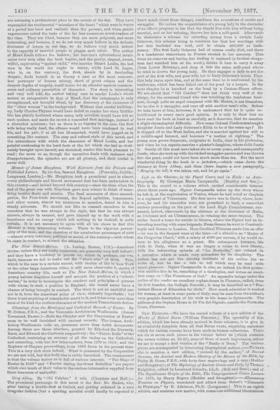Grey Abbey. By "Old Calabar." 2 vols. (Chapman and Hall.)—
The prominent personage in this novel is the Rev. Mr. Sladen, who, after taking a double-first at Oxford, and getting ordained in a very irregular fashion (but a sporting novelist could hardly be expected to know much about these things), combines the avocations of curate and smuggler. He makes the acquaintance of arming lady in the character of an officer, proposes to her that she should live with him without being married, and on her refusing, throws her into a mill-pond. Afterwards he elaborates a scheme for extorting money from a certain Lady Grierson, this scheme being to convince her that her marriage with her late husband was void, and to obtain £20,000 as hush- money. The first Lady Grierson had of course really died, and there is a tombstone somewhere in France erected to her memory. This stone he removes and buries, but finding it replaced (a brother clergy- man had watched him at his work), thinks it best to carry it away (from Lower Brittany), and drop it into the same mill-pond where he tried to drown the young lady. He then engages a lady to act the part of the first wife, and goes with her to Lady Grierson's house. Then this lady turns upon him, and at the same time he is confronted by the tombstone, which has been fished out of the pond by a keeper. In the next chapter he is knocked on the bead by a Custom-House officer. We are afraid that " Old Calabar " does not think very well of the clergy, for the reverend friend who was watching the tombstone busi- ness, though quite an angel compared with Mr. Sladen, is not blameless, for he also is a smuggler, and rune of with another man's wife. Before we take leave of him, however, it is understood that he is quite re- habilitated in every one's good opinion. It is only to show that we have read the book at least as carefully as it deserves, that we mention a slight chronological difficulty. How came Colonel Featherstonhaugh's daughter Jessie and Lady Grierson's Edith to be of the same age ? Ho is shipped off to the West Indies, and she is married against her will to a middle-aged baronet, and becomes " a mother at eighteen." The young man grows desperate, emigrates to India, rises in his profession, and when he is a captain marries a planter's daughter, whose child Jessie is. Surely all this must have taken six or seven years, and consequently Jessie, when she took up with the wicked smuggler-parson and was thrown into the pond, could not have been much more than ton. But the most wonderful thing in the book is a jackdaw,—which came down the chimney at Grey Abbey, and then (hero begins a new paragraph), " Ringing the bell, it was taken out, and let go again."






































 Previous page
Previous page